a&e features
Hillary’s historic moment
Long-time feminists say gender is a factor in this year’s race
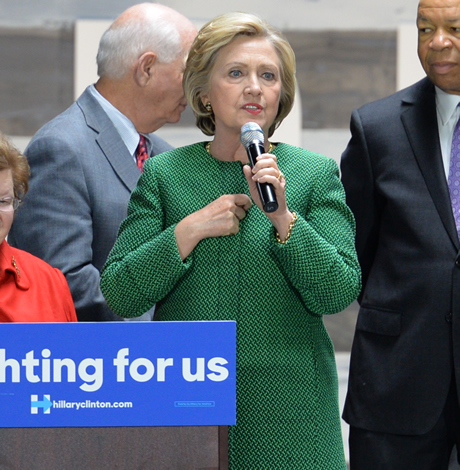

Hillary Clinton enjoys strong support among lesbian feminists. (Photo by Gino Santa Maria; courtesy Bigstock)
Benghazi! Hillary’s e-mails! Trump! At danger of getting lost in the overheated discourse of this year’s U.S. presidential election is the historic fact that Hillary Clinton is now the first woman to capture a major-party nomination for president.
There was Shirley Chisholm (who ran for the Democratic nomination in 1972), Geraldine Ferraro (Walter Mondale’s running mate in 1984), even Sarah Palin (John McCain’s running mate in 2008), but no woman has ever come as close to the presidency as Hillary Clinton.
In the wake of this achievement, what does it mean for the lesbian community, a group that has always been one of her strongest supporters? And why has the historic nature of her candidacy felt like little more than a footnote this year?
Hillary fatigue?
Out political comedian Kate Clinton thinks it’s because Hillary has been around so long — since 1978. Still, she says, it’s exciting to see Hillary win the nomination.
“I think it’s absolutely very, very exciting,” Kate Clinton says. “And add to the fact that she is the first woman nominee for a major party, is astounding.”
As the first out lesbian and African-American mayor in the United States, Denise Simmons of Cambridge, Mass., is used to her gender, race and sexual orientation making headlines.
Simmons expected Hillary’s nomination to get much more attention than it’s received. She agrees with Kate Clinton’s assessment.
“I do wonder if perhaps part of this is simply because she has been a national figure for such a long time,” Simmons says. “And therefore the sense of novelty just isn’t there.”
Elizabeth Birch, who served as executive director of the Human Rights Campaign from 1995-2004 and is also a friend of Clinton’s, says Clinton does not want the fact that she’s a woman to be the sole reason for anyone to vote for her.
“I think that’s why she’s been painstaking about amassing her credentials over the last two decades,” Birch says. “She absolutely wants [her election] to be on her merit, but nevertheless, none of us should forget what an extraordinary breakthrough this will be.”
Clinton’s gender, Birch says, is treated like a distraction from the “political theater” going on.
Blues singer and LGBT and black rights activist Gaye Adegbalola agrees with Birch. She thinks Clinton’s nomination isn’t headline news because Trump has “hijacked” the headlines.
“He’s the story,” Adegbalola says.
Kate Clinton says that any time some excitement is generated for Clinton, Trump will say something controversial, Benghazi and the email scandal are brought up and Americans become fixated on her purported failures.
“The Koch brothers, who, I like to call the cock brotherhood, have targeted money to just make her unfavorable, untrustworthy,” Kate Clinton says.
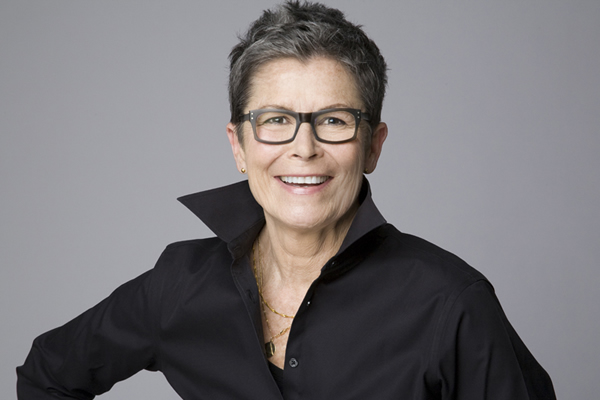
Kate Clinton says accusations that Hillary Clinton is untrustworthy are ‘absurd.’ (Blade file photo)
Trust issues
Kate Clinton says the fact that Hillary Clinton is painted as untrustworthy in the news media is absurd.
But, in many recent polls, conducted by the Huffington Post, pollingreport.com and CNN, many Americans say they do not trust Hillary Clinton.
Is the lack of trust in Hillary because of her politics, or could it be attributed to sexism?
Birch doesn’t think so.
“My diagnosis is that Hillary Clinton is extremely private for someone in the public sphere,” she says. “And she has, throughout her life, had unrealistic expectations for privacy.”
Birch says that in trying to protect her privacy and keep her life and decisions under wraps, Clinton has been misread.
“The level of transparency that’s required when you are in a position like the various positions she’s been in … all those steps she took to preserve privacy only lead to more problems,” she says. “You know, it’s never the actual crime, it’s always the cover-up.”
This, according to Birch, has always been Clinton’s downfall.
“The Clintons, as political figures, have certainly been guarded at many points throughout the past three decades, often with good reason,” Birch says. “And unfortunately this has opened Hillary Clinton to charges of having something to hide.”
Simmons disagrees with Birch. She says the lack of trust among voters has a lot to do with gender.
“Any time a female candidate is painted as untrustworthy, or shrill or calculating, one does wonder whether there is some sexism at play,” Simmons says.
Rev. Elder Darlene Garner, minister and LGBT activist and co-founder of the National Coalition of Black Lesbians and Gays, makes a different assessment. She blames populism for Clinton’s perceived untrustworthiness.
“I think it is blatant populism that masks sexism, that masks homophobia and transphobia, that masks racism and nationalism,” Garner says.
Adegbalola says that anyone who’s been in Washington as long as the Clintons will undoubtedly amass some “dirt,” but she says this is just how politics works.
“There has to be some bargaining and there has to be some, ‘I’ll kiss your ass, you kiss mine,’ kind of stuff that goes on,” she says.
When Hillary Clinton ran against Barack Obama in 2008, Adegbalola donated $25 to her campaign.
“I was all, you know, ‘Yay, a woman can do this,’ and then Barack started running and I was so in favor of him,” Adegbalola says. “Not necessarily because he was a black man, but because he hadn’t been in D.C. [for long].”
She also liked that he had worked for social justice in Chicago and that he had not been in the U.S. Senate for long.
“My excitement with him was that he was an outsider,” she says. “So now, here you got Trump, who comes along and he’s really an outsider and an asshole, but I think a lot of people take to him for that very reason, that he’s an outsider.”
Adegbalola thinks it’s hypocritical, however, for people to distrust Clinton but not Trump.
“Anybody who makes all that money,” Adegbalola says, “they’ve got to be doing some shady stuff, too.”
She’s astonished by how successful Trump has been.
Garner is surprised too and thinks that Trump’s success reveals the continued work for justice and equality that needs to be done.
“As a movement we have focused on legislative gains and have not given much attention to the quality of our relationships with one another,” Garner says.
Kate Clinton, on the other hand, does not think it’s surprising that Trump has been so successful. She is tired of people, especially Republicans, acting as if he is not representative of certain American beliefs.
She views Trump as a joke who desperately wants to be taken seriously.
“That’s where the danger is,” she says.
Kate Clinton believes that Trump’s desire to be taken seriously boiled over at the White House Correspondents Dinner in 2011. Obama referred to Trump’s threat to run for president at that dinner as a “joke.” Kate Clinton theorizes that Obama’s barrage of jokes at Trump’s expense is what propelled him to run.
“I really think that was the moment he decided, ‘I am not going to have a black man making fun of me,’” Clinton says.
Birch describes Trump as “dangerous.”
“I think the way that human society stays in equilibrium is to have extremely predictable institutions and leaders,” Birch says. “[If leaders] innovate somewhat in the structure of the institutions, I think humans don’t want jarring abrupt moves and they don’t want emotions stirred, played on and exploited.”
Trouble ahead?
Birch says unpredictable leaders bring problems.
“I think that waves move through every community and I think that his rhetoric has given license to some of this more acute tension in our country right now,” she says.
Simmons agrees.
“I find it incredibly disappointing that one of our major parties would see fit to nominate him to potentially lead the country,” she says. “He could do tremendous damage to our nation on a number of fronts.”
Adegbalola says a Trump presidency could be cataclysmic.
“I think it’s going to be even more divisive for America,” she says. “I think it’s going to widen the gaps between people of color and whites and marginalized people and the white establishment. I’m sure he has a lot of confederate flags in that audience, I’m sure.”
Kate Clinton cites Trump’s nomination of Mike Pence for vice president as representative of his disregard for the rights of marginalized people.
“Pence is hideous toward women,” she says.
Pence came to national attention in 2006 when he said that LGBT couples represented a “societal collapse” in the United States. He has often referred to being gay as a choice and same-sex partnerships as a violation of “God’s idea.”
He made national news again in 2011 when, as a member of Congress, he pushed for a bill to defund Planned Parenthood. In May, Pence rejected the Obama administration’s directive for school districts to allow students to use the bathroom for the gender they identify with saying the Obama administration had no business getting involved in “issues of this nature.”
Adegbalola also points out what could happen to the Supreme Court if Trump is elected.
Despite all this, there are still many people who look at Hillary Clinton’s past and are disturbed by her voting patterns.
In 1996, she supported the Defense of Marriage Act that defined marriage for federal purposes as the union between one man and one woman, and allowed states to refuse to recognize same-sex marriages performed under the laws of other states. Her support for the bill haunted her for two decades.
Kate Clinton says that the LGBT community needs to remember that she was not president when the act was passed.
“That was her husband,” Clinton says. “I think she was pretty representative of very political people weighing everything, trying to figure out and trying to say the right thing at the right time and that killed her career.”
In a campaign that many say is structured around humiliation and elitism, Garner says that voting for Hillary Clinton is important.
“I believe that she is a champion for human dignity and justice and I would expect that as president she would continue to do the same,” she says.
She cites Clinton’s attitudes toward children as proof that her presidency would benefit LGBT families.
“Her support of health care and even continued health care reform, will benefit all of us, including women,” Garner says. “And her economic policies will also benefit women, who are still underpaid in the American work force, and her presidency will be a direct benefit to lesbians as well as to all women.”
Adegbalola cites her own experiences as a self-employed musician and cancer survivor as one of the main reasons she plans to vote for Clinton. She says that in 2008 she was paying more than $700 a month for cancer treatment.
The Affordable Care Act, she says, is of paramount importance to her and she knows that under Clinton, Obama’s work will continue.
Birch says that growing up in Canada and seeing Queen Elizabeth’s picture hanging on the wall in all of her elementary school classrooms and having a female principal, made her think that women were in charge.
“I just thought, ‘Oh yeah my name is Elizabeth, the queen is Elizabeth, I guess I can go far,’” she says. “The psychological impact it will have on inspiring and lighting fires in young women … we can never underestimate it.”
Adegbalola, however, says at this point she is over Clinton’s gender.
“I’m simply looking at who would I vote for between the two,” she says. “[It’s] Hillary, there’s no question. And she’s smart and she’s been there, she’s paid her dues.”
Adegbalola doesn’t feel that anyone in the Republican Party, including Trump, would do anything to look out for marginalized people.
“I’m black, I’m poor, I’m a woman, I’m a lesbian, I’m a single parent, I’m old,” she says. “[That’s] like six kinds of oppression, so they might lock me up in a concentration camp.”
a&e features
Visit Cambridge, a ‘beautiful secret’ on Maryland’s Eastern Shore
New organization promotes town’s welcoming vibe, LGBTQ inclusion

CAMBRIDGE, Md. — Driving through this scenic, historic town on Maryland’s Eastern Shore, you’ll be charmed by streets lined with unique shops, restaurants, and beautifully restored Victorian homes. You’ll also be struck by the number of LGBTQ Pride flags flying throughout the town.
The flags are a reassuring signal that everyone is welcome here, despite the town’s location in ruby red Dorchester County, which voted for Donald Trump over Kamala Harris by a lopsided margin. But don’t let that deter you from visiting. A new organization, Proudly Cambridge, is holding its debut Pride event this weekend, touting the town’s welcoming, inclusive culture.
“We stumbled on a beautiful secret and we wanted to help get the word out,” said James Lumalcuri of the effort to create Proudly Cambridge.
The organization celebrates diversity, enhances public spaces, and seeks to uplift all that Cambridge has to share, according to its mission statement, under the tagline “You Belong Here.”
The group has so far held informal movie nights and a picnic and garden party; the launch party is June 28 at the Cambridge Yacht Club, which will feature a Pride celebration and tea dance. The event’s 75 tickets sold out quickly and proceeds benefit DoCo Pride.
“Tickets went faster than we imagined and we’re bummed we can’t welcome everyone who wanted to come,” Lumalcuri said, adding that organizers plan to make “Cheers on the Choptank” an annual event with added capacity next year.
One of the group’s first projects was to distribute free Pride flags to anyone who requested one and the result is a visually striking display of a large number of flags flying all over town. Up next: Proudly Cambridge plans to roll out a program offering affirming businesses rainbow crab stickers to show their inclusiveness and LGBTQ support. The group also wants to engage with potential visitors and homebuyers.
“We want to spread the word outside of Cambridge — in D.C. and Baltimore — who don’t know about Cambridge,” Lumalcuri said. “We want them to come and know we are a safe haven. You can exist here and feel comfortable and supported by neighbors in a way that we didn’t anticipate when we moved here.”

Lumalcuri, 53, a federal government employee, and his husband, Lou Cardenas, 62, a Realtor, purchased a Victorian house in Cambridge in 2021 and embarked on an extensive renovation. The couple also owns a home in Adams Morgan in D.C.
“We saw the opportunity here and wanted to share it with others,” Cardenas said. “There’s lots of housing inventory in the $300-400,000 range … we’re not here to gentrify people out of town because a lot of these homes are just empty and need to be fixed up and we’re happy to be a part of that.”
Lumalcuri was talking with friends one Sunday last year at the gazebo (affectionately known as the “gayzebo” by locals) at the Yacht Club and the idea for Proudly Cambridge was born. The founding board members are Lumalcuri, Corey van Vlymen, Brian Orjuela, Lauren Mross, and Caleb Holland. The group is currently working toward forming a 501(c)3.
“We need visibility and support for those who need it,” Mross said. “We started making lists of what we wanted to do and the five of us ran with it. We started meeting weekly and solidified what we wanted to do.”
Mross, 50, a brand strategist and web designer, moved to Cambridge from Atlanta with her wife three years ago. They knew they wanted to be near the water and farther north and began researching their options when they discovered Cambridge.
“I had not heard of Cambridge but the location seemed perfect,” she said. “I pointed on a map and said this is where we’re going to move.”
The couple packed up, bought a camper trailer and parked it in different campsites but kept coming back to Cambridge.
“I didn’t know how right it was until we moved here,” she said. “It’s the most welcoming place … there’s an energy vortex here – how did so many cool, progressive people end up in one place?”
Corey van Vlymen and his husband live in D.C. and were looking for a second home. They considered Lost River, W.Va., but decided they preferred to be on the water.
“We looked at a map on both sides of the bay and came to Cambridge on a Saturday and bought a house that day,” said van Vlymen, 39, a senior scientist at Booz Allen Hamilton. They’ve owned in Cambridge for two years.
They were drawn to Cambridge due to its location on the water, the affordable housing inventory, and its proximity to D.C.; it’s about an hour and 20 minutes away.
Now, through the work of Proudly Cambridge, they hope to highlight the town’s many attributes to residents and visitors alike.
“Something we all agree on is there’s a perception problem for Cambridge and a lack of awareness,” van Vlymen said. “If you tell someone you’re going to Cambridge, chances are they think, ‘England or Massachusetts?’”
He cited the affordability and the opportunity to save older, historic homes as a big draw for buyers.
“It’s all about celebrating all the things that make Cambridge great,” Mross added. “Our monthly social events are joyful and celebratory.” A recent game night drew about 70 people.
She noted that the goal is not to gentrify the town and push longtime residents out, but to uplift all the people who are already there while welcoming new visitors and future residents.
They also noted that Proudly Cambridge does not seek to supplant existing Pride-focused organizations. Dorchester County Pride organizes countywide Pride events and Delmarva Pride was held in nearby Easton two weeks ago.
“We celebrate all diversity but are gay powered and gay led,” Mross noted.
To learn more about Proudly Cambridge, visit the group on Facebook and Instagram.
What to see and do
Cambridge, located 13 miles up the Choptank River from the Chesapeake Bay, has a population of roughly 15,000. It was settled in 1684 and named for the English university town in 1686. It is home to the Harriet Tubman Museum, mural, and monument. Its proximity to the Blackwater National Wildlife Refuge makes it a popular stop for birders, drawn to more than 27,000 acres of marshland dubbed “the Everglades of the north.”
The refuge is walkable, bikeable, and driveable, making it an accessible attraction for all. There are kayaking and biking tours through Blackwater Adventures (blackwateradventuresmd.com).
Back in town, take a stroll along the water and through historic downtown and admire the architecture. Take in the striking Harriet Tubman mural (424 Race St.). Shop in the many local boutiques, and don’t miss the gay-owned Shorelife Home and Gifts (421 Race St.), filled with stylish coastal décor items.
Stop for breakfast or lunch at Black Water Bakery (429 Race St.), which offers a full compliment of coffee drinks along with a build-your-own mimosa bar and a full menu of creative cocktails.
The Cambridge Yacht Club (1 Mill St.) is always bustling but you need to be a member to get in. Snapper’s on the water is temporarily closed for renovations. RaR Brewing (rarbrewing.com) is popular for craft beers served in an 80-year-old former pool hall and bowling alley. The menu offers burgers, wings, and other bar fare.
For dinner or wine, don’t miss the fantastic Vintage 414 (414 Race St.), which offers lunch, dinner, wine tasting events, specialty foods, and a large selection of wines. The homemade cheddar crackers, inventive flatbreads, and creative desserts (citrus olive oil cake, carrot cake trifle) were a hit on a recent visit.
Also nearby is Ava’s (305 High St.), a regional chain offering outstanding Italian dishes, pizzas, and more.
For something off the beaten path, visit Emily’s Produce (22143 Church Creek Rd.) for its nursery, produce, and prepared meals.
“Ten minutes into the sticks there’s a place called Emily’s Produce, where you can pay $5 and walk through a field and pick sunflowers, blueberries, you can feed the goats … and they have great food,” van Vlymen said.
As for accommodations, there’s the Hyatt Regency Chesapeake Bay (100 Heron Blvd. at Route 50), a resort complex with golf course, spa, and marina. Otherwise, check out Airbnb and VRBO for short-term rentals closer to downtown.
Its proximity to D.C. and Baltimore makes Cambridge an ideal weekend getaway. The large LGBTQ population is welcoming and they are happy to talk up their town and show you around.
“There’s a closeness among the neighbors that I wasn’t feeling in D.C.,” Lumalcuri said. “We look after each other.”
a&e features
James Baldwin bio shows how much of his life is revealed in his work
‘A Love Story’ is first major book on acclaimed author’s life in 30 years

‘Baldwin: A Love Story’
By Nicholas Boggs
c.2025, FSG
$35/704 pages
“Baldwin: A Love Story” is a sympathetic biography, the first major one in 30 years, of acclaimed Black gay writer James Baldwin. Drawing on Baldwin’s fiction, essays, and letters, Nicolas Boggs, a white writer who rediscovered and co-edited a new edition of a long-lost Baldwin book, explores Baldwin’s life and work through focusing on his lovers, mentors, and inspirations.
The book begins with a quick look at Baldwin’s childhood in Harlem, and his difficult relationship with his religious, angry stepfather. Baldwin’s experience with Orilla Miller, a white teacher who encouraged the boy’s writing and took him to plays and movies, even against his father’s wishes, helped shape his life and tempered his feelings toward white people. When Baldwin later joined a church and became a child preacher, though, he felt conflicted between academic success and religious demands, even denouncing Miller at one point. In a fascinating late essay, Baldwin also described his teenage sexual relationship with a mobster, who showed him off in public.
Baldwin’s romantic life was complicated, as he preferred men who were not outwardly gay. Indeed, many would marry women and have children while also involved with Baldwin. Still, they would often remain friends and enabled Baldwin’s work. Lucien Happersberger, who met Baldwin while both were living in Paris, sent him to a Swiss village, where he wrote his first novel, “Go Tell It on the Mountain,” as well as an essay, “Stranger in the Village,” about the oddness of being the first Black person many villagers had ever seen. Baldwin met Turkish actor Engin Cezzar in New York at the Actors’ Studio; Baldwin later spent time in Istanbul with Cezzar and his wife, finishing “Another Country” and directing a controversial play about Turkish prisoners that depicted sexuality and gender.
Baldwin collaborated with French artist Yoran Cazac on a children’s book, which later vanished. Boggs writes of his excitement about coming across this book while a student at Yale and how he later interviewed Cazac and his wife while also republishing the book. Baldwin also had many tumultuous sexual relationships with young men whom he tried to mentor and shape, most of which led to drama and despair.
The book carefully examines Baldwin’s development as a writer. “Go Tell It on the Mountain” draws heavily on his early life, giving subtle signs of the main character John’s sexuality, while “Giovanni’s Room” bravely and openly shows a homosexual relationship, highly controversial at the time. “If Beale Street Could Talk” features a woman as its main character and narrator, the first time Baldwin wrote fully through a woman’s perspective. His essays feel deeply personal, even if they do not reveal everything; Lucian is the unnamed visiting friend in one who the police briefly detained along with Baldwin. He found New York too distracting to write, spending his time there with friends and family or on business. He was close friends with modernist painter Beauford Delaney, also gay, who helped Baldwin see that a Black man could thrive as an artist. Delaney would later move to France, staying near Baldwin’s home.
An epilogue has Boggs writing about encountering Baldwin’s work as one of the few white students in a majority-Black school. It helpfully reminds us that Baldwin connects to all who feel different, no matter their race, sexuality, gender, or class. A well-written, easy-flowing biography, with many excerpts from Baldwin’s writing, it shows how much of his life is revealed in his work. Let’s hope it encourages reading the work, either again or for the first time.
a&e features
Looking back at 50 years of Pride in D.C
Washington Blade’s unique archives chronicle highs, lows of our movement
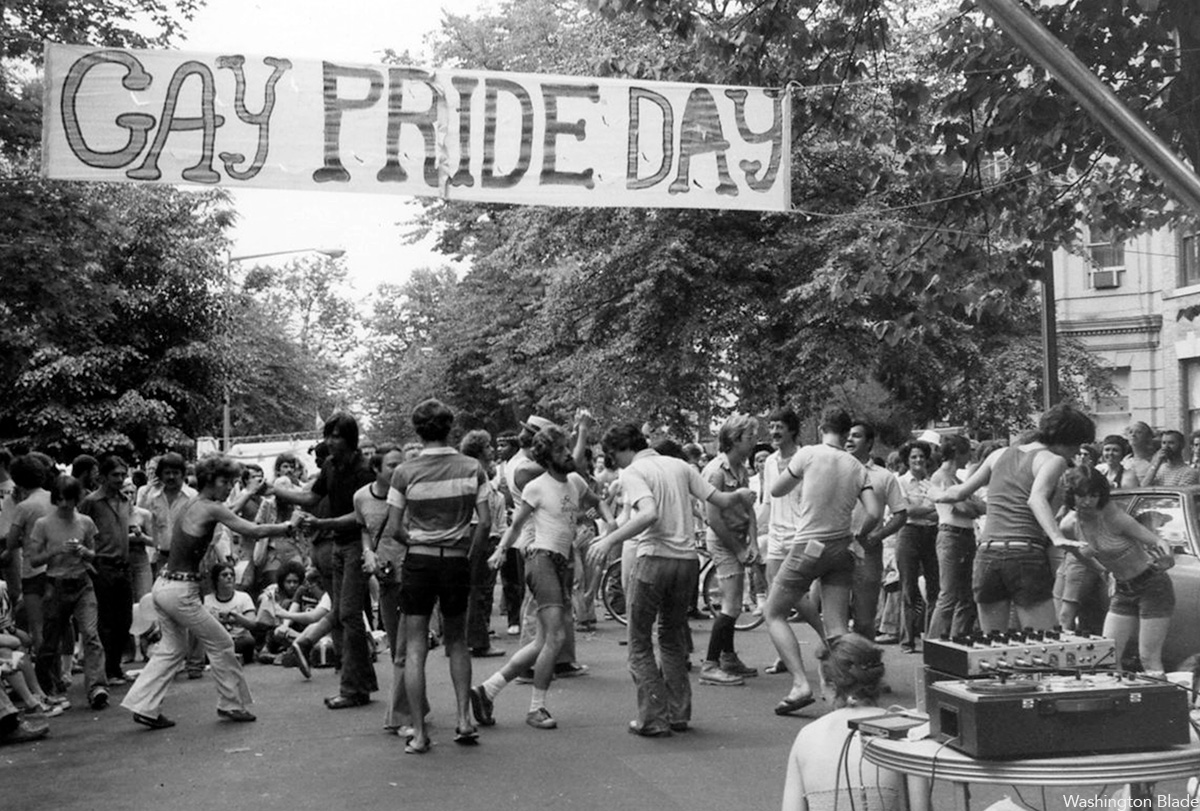
To celebrate the 50th anniversary of LGBTQ Pride in Washington, D.C., the Washington Blade team combed our archives and put together a glossy magazine showcasing five decades of celebrations in the city. Below is a sampling of images from the magazine but be sure to find a print copy starting this week.

The magazine is being distributed now and is complimentary. You can find copies at LGBTQ bars and restaurants across the city. Or visit the Blade booth at the Pride festival on June 7 and 8 where we will distribute copies.
Thank you to our advertisers and sponsors, whose support has enabled us to distribute the magazine free of charge. And thanks to our dedicated team at the Blade, especially Photo Editor Michael Key, who spent many hours searching the archives for the best images, many of which are unique to the Blade and cannot be found elsewhere. And thanks to our dynamic production team of Meaghan Juba, who designed the magazine, and Phil Rockstroh who managed the process. Stephen Rutgers and Brian Pitts handled sales and marketing and staff writers Lou Chibbaro Jr., Christopher Kane, Michael K. Lavers, Joe Reberkenny along with freelancer and former Blade staffer Joey DiGuglielmo wrote the essays.

The magazine represents more than 50 years of hard work by countless reporters, editors, advertising sales reps, photographers, and other media professionals who have brought you the Washington Blade since 1969.
We hope you enjoy the magazine and keep it as a reminder of all the many ups and downs our local LGBTQ community has experienced over the past 50 years.
I hope you will consider supporting our vital mission by becoming a Blade member today. At a time when reliable, accurate LGBTQ news is more essential than ever, your contribution helps make it possible. With a monthly gift starting at just $7, you’ll ensure that the Blade remains a trusted, free resource for the community — now and for years to come. Click here to help fund LGBTQ journalism.
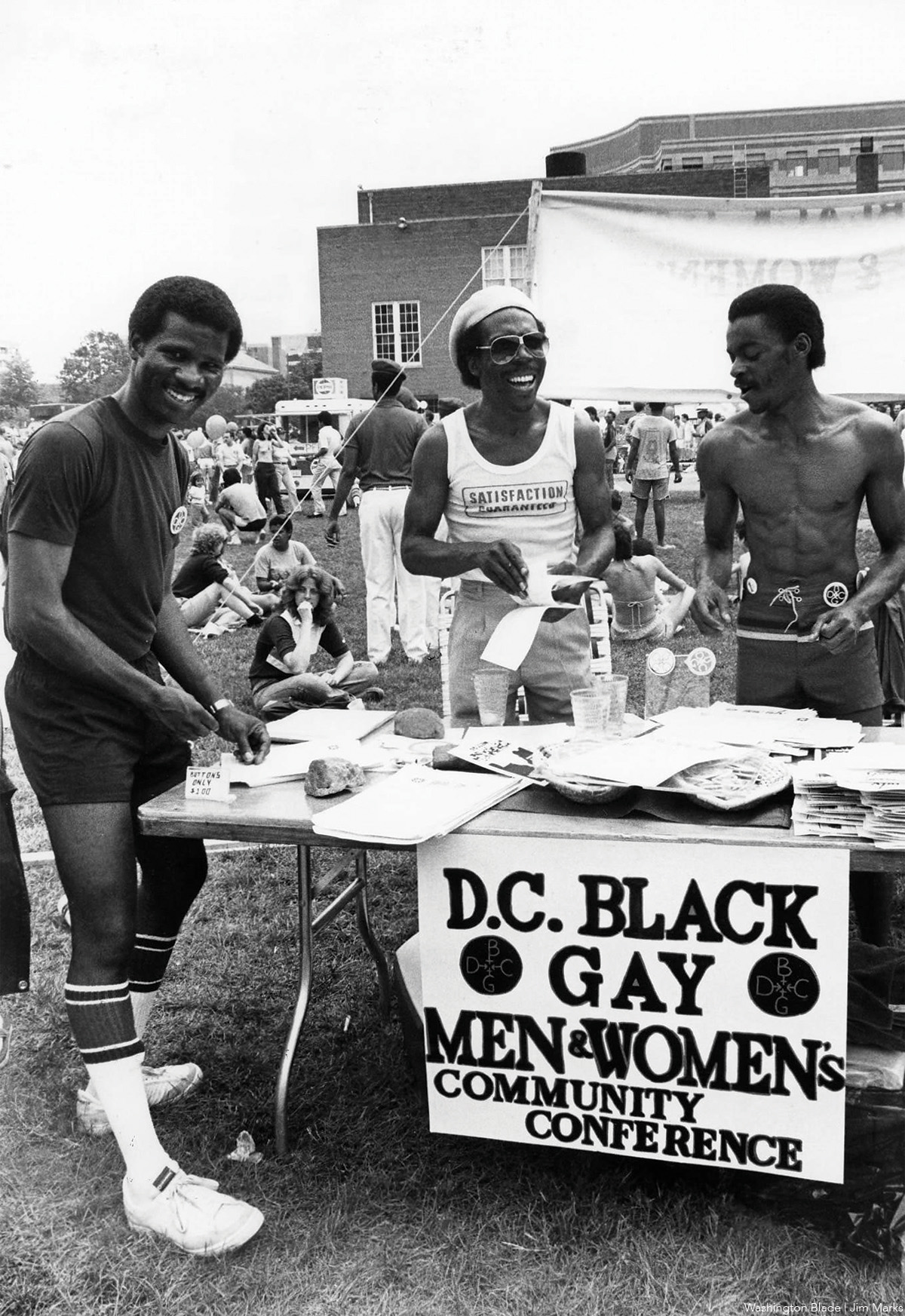


-

 U.S. Supreme Court4 days ago
U.S. Supreme Court4 days agoSupreme Court upholds ACA rule that makes PrEP, other preventative care free
-

 U.S. Supreme Court4 days ago
U.S. Supreme Court4 days agoSupreme Court rules parents must have option to opt children out of LGBTQ-specific lessons
-

 National5 days ago
National5 days agoEvan Wolfson on the 10-year legacy of marriage equality
-

 Congress5 days ago
Congress5 days agoSenate parliamentarian orders removal of gender-affirming care ban from GOP reconciliation bill

